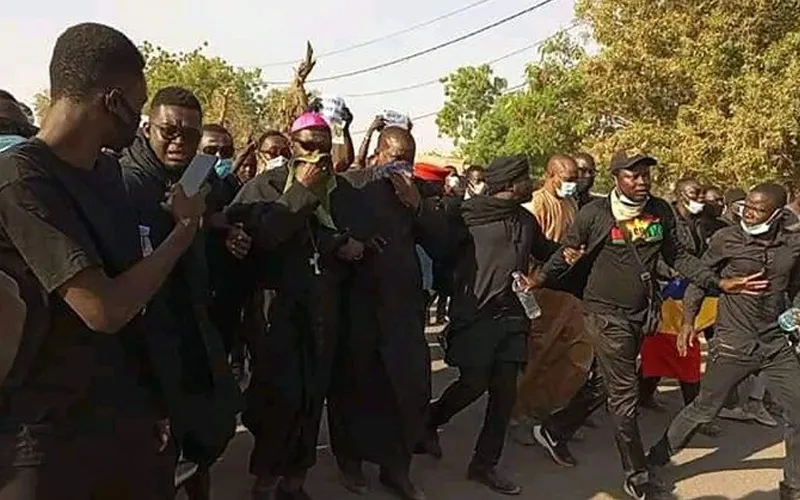“We went through the Aigle roundabout. And then we saw the people arriving and so we went to meet them and we got out of our car,” Fr. Kouldjim recounts the events of February 15.
He continues, “We walked with the crowd that was advancing towards the place of mourning and suddenly three trucks full of policemen arrived. They started shooting tear gas.”
The Catholic Priest further says that together with the Archbishop, they managed to “overtake the crowd and in front of them and the police saw us, so the three vehicles left and we continued our march.”
“Suddenly another contingent of seven or eight vehicles arrived. And it is at this moment that they fired tear gas at us from all sides,” CET Secretary General says.
He adds, “A gas canister hit Archbishop Edmond on his right knee and another on his lower abdomen. I also took one on the lower abdomen, but we moved forward anyway with the pain.”
(Story continues below)
Fr. Kouldjim says that the Archbishop, a section of youth, and he had to retreat to a safe corner because the shooting was getting more intense.
“A lot of young people dispersed,” he says, adding that the shots were coming from “all angles with tear gas. That's when two young people were injured in the leg and in the right forearm.”
The two injured were transported to Our Lady Hospital by the Archbishop who later returned to the headquarters of CET, Fr. Kouldjim says.
The February 15 incident caused an outburst on social media with many appealing for prayers for Archbishop Djtangar.
“I thank everyone for all the expressions of sympathy and solidarity and for taking the time to pray for Chad. I am fine. No panic,” Archbishop Djitangar has been quoted as saying in a February 15 report.
In the February 15 Facebook video, Fr. Kouldjim describes the recent cases of violence in Chad as an “added pain to the suffering of our brothers and sisters who died in Abeche and in Santana.”
“Those who died are our brothers and sisters; they are Chadians,” he says, and continues, “If people want to mourn for those who died, they have the right, as human beings, to do so.
Making reference to the peaceful march, the Catholic Priest clarifies, “We did not go out to protest. We went to mourn our fallen brothers and sisters.”
Jude Atemanke is a Cameroonian journalist with a passion for Catholic Church communication. He holds a Bachelor’s Degree in Journalism and Mass Communication from the University of Buea in Cameroon. Currently, Jude serves as a journalist for ACI Africa.








